
by Steve | Oct 26, 2016 | Magazine, Magazine Articles, Sept-Oct 2016

Rev. Rob Renfroe
By Rob Renfroe-
Many people were shocked, actually offended, when Dr. Ted Campbell told the World Methodist Conference, “The question at this point is not whether we divide or not. That, I fear, is a given now.” A United Methodist elder and noted history professor at Southern Methodist University’s Perkins School of Theology, Campbell told a large crowd gathered in Houston, Texas, on September 1, that it is unlikely that the denomination can hold together.
Such admissions are not usually made in public, especially by persons of Dr. Campbell’s stature. However, behind closed doors, others representing The United Methodist Church are making the same prediction. One bishop told me that coming out of the bishop’s commission, “There will be some kind of structural separation. I hope we can maintain some connection around our central mission of making disciples, but structural separation will be the end result.”
Another bishop was even more blunt in his remarks to me: “We may be able to maintain some kind of connection, but the structural separation that will occur as a result of the commission will be so different than where the church is today, that ten years ago it would have been referred to as schism.”
Several leading “centrist” pastors have come to the same conclusion. One put it simply, “I think separation is inevitable.” Another who had been a supporter of A Third Way was even more pointed in his remarks. “We all know we’re going to split. All this happy talk about staying together is just a bunch of nonsense.”
The election of the Rev. Karen Oliveto to the episcopacy has increased the likelihood that The United Methodist Church will not be able to remain in its present form. Though our Book of Discipline states that self-avowed practicing homosexuals may not serve in ordained ministry, Oliveto is legally married to her long-time partner, another woman. Still, the Western Jurisdiction chose her to become one of our newest bishops. This came on top of at least nine annual conferences and two jurisdictional conferences that have committed to not “conform or comply” with the parts of the Discipline they disagree with. This leaves many of our evangelical churches trying to maintain what Methodism has always been in parts of the country where the church has left them.
The response has been predictable. Some churches are withholding their apportionments and others have retained legal counsel to determine how they might leave the denomination. The election of the Rev. Gene Robinson as bishop by the Episcopal Church set in motion a chain of events that led many Episcopal congregations to eventually create a new denomination, the Anglican Church in North America.
I take no joy in believing that there may be a separation within the UM Church, whether we maintain some connection or not. This is the church I love. This is the church where I found Jesus, or better, where he found me. This is the church that has nurtured and discipled me. And this is the church that has affirmed my gifts and my calling. And I will be forever grateful to The United Methodist Church.
I do not rejoice that we have arrived at this place. But I am hopeful that we are moving towards a new beginning.
I can see a new Methodist movement, either within the UM Church or, if it must be, outside of it.
It will be a movement that is not top down, but bottom up. One where boards and agencies actually serve the local church and are responsible to us. One where we are organized like a missional force that wants to change the world, not like a bloated bureaucracy.
I can see a movement where we don’t argue over the authority of Scripture or what the Bible teaches about sexuality. Where our seminaries prepare godly men and women to do ministry instead of being schools of religion where some faculty members don’t believe in our doctrines, and teach the latest theological fads that have no power to change the world and that will be forgotten within a generation.
It will be a movement that has freedom to plant evangelical churches on the coasts and in northern urban centers where people will still respond to the Gospel of Jesus Christ if it is presented by servant communities with grace and truth.
I can see a Wesleyan movement that cares about the rejected, the outcast, and the marginalized – cares about them enough both to minister to their physical needs and to tell them how their sins can be forgiven and their souls can be saved.
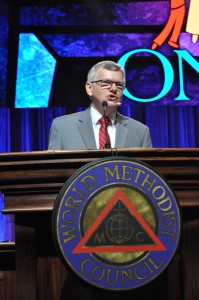
Dr. Ted Campbell. Photo courtesy of the World Methodist Council.
I can see a movement that you and I will be excited and proud to be a part of.
It will be a new Wesleyan expression for the 21st century. It will be filled with the power of God and the compassion of Christ that compels it into a lost world that needs Jesus.
There is a new day coming. And we are going to be a part of it. Those of you who are young will have decades to enjoy it and shape it and be blessed by it. Those of us who are older will one day before we die look back and say, “The Lord has done a new thing, and it was marvelous in our sight. And he was gracious enough to let us be a part of its beginning.”
Friends, my hope and my prayer is that we will walk into this new day together. This is no time to become discouraged or to grow weary. A better day is coming and it fills my heart with joy to think of us walking into it together for the glory of our Lord and Savior.
Rob Renfroe is the president and publisher of Good News.

by Steve | Oct 26, 2016 | Magazine, Magazine Articles, Sept-Oct 2016
By Courtney Lott-
Congratulations to Impact Church, Embrace Church, and New Covenant United Methodist Church for ranking among the fastest growing churches in the United States in the latest issue of Outreach Magazine.
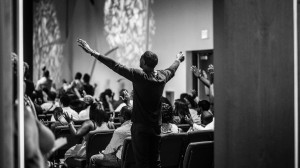 Impact Church
Impact Church
East Point, Georgia
Lead Pastor Olu Brown’s vision for a multicultural gathering of believers has come to pass at Impact Church. Striving to connect their community with God and each other, they work to redefine the church experience through “inclusiveness, relatable messages, energetic worship, relevant youth programs and impactful community outreach.” With two campuses in East Point, Georgia, Impact Church has grown rapidly since its inception in 2007.
They describe their mantra “doing church differently” as an action, a call to share God’s love with the world and to be part of a community that builds and strengthens those around them.
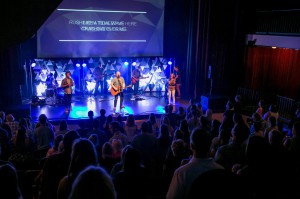
Photo by Bri Roegiers
Embrace Church
Sioux Falls, South Dakota
An initiative of Cornerstone (United Methodist) Church in Watertown, South Dakota, Embrace started with a simple worship service consisting of 32 individuals in 2006. Though uncertain of what might come of this gathering, this group followed the Lord’s call to offer the growing city of Sioux Falls another church. They grew quickly into what would become Embrace Church, welcoming new worshipers each month. Under the leadership of Adam Weber, this congregation has gone from meeting once a month in people’s homes, to six campuses, including one online. Striving to live up to their name, Embrace Church prays that they would draw people in as the father draws in the prodigal son.
In a welcome video on the Embrace website, Weber says, “Our hope is to truly encounter, the living God. That we wouldn’t just be a group of people who gather, but our intent would be greater than that, that we would encounter Him.”
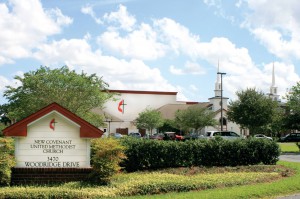
New Covenant United Methodist Church
The Villages, Florida
In Florida, New Covenant United Methodist Church is another one of the fastest growing churches in the United States. Led by Rev. Harold Hendren, the congregation sees welcoming others into a personal relationship with Jesus Christ as its highest calling. Striving to be the hands and feet of Christ, New Covenant serves their communities of Summerhill and Lake Denton, Florida, in a number of ways. Their ministries include grief and Alzheimer’s support, transportation services, and visitation.
“One of the things we really pride ourselves on here at New Covenant is that we really have a heart for serving the Lord and our extended community,” says Hendren in a welcome video to their website. “It’s good to be able to serve the Lord together as brothers and sisters in Jesus Christ.”
Courtney Lott is the editorial assistant at GOOD NEWS.

by Steve | Oct 26, 2016 | Magazine, Magazine Articles, Sept-Oct 2016
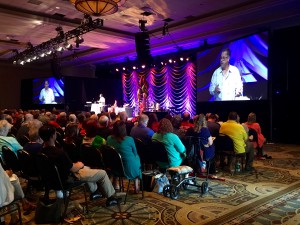
United Methodists with Aldersgate Renewal Ministries gathered in Lexington, Kentucky, for their July event. Photo by Steve Beard.
There is a spiritual stirring within United Methodism. In the midst of chaotic and difficult times for our denomination, there is a simultaneous movement calling for a renewal of our minds and hearts. In addition to the launch of the Wesleyan Covenant Association, we are grateful for ministries seeking to stoke the embers of revival within United Methodism.
In July, more than a thousand United Methodists involved with Aldersgate Renewal Ministries gathered at their National Conference on Spirit Filled Living in Lexington, Kentucky. In addition to energetic plenary sessions, the conference has played host to seminars on topics such as Discerning the Voice of God, Spiritual Healing in a Local Congregation, Baptism in the Holy Spirit, Miracles, Raising the Dead throughout History and Today, Celebrating God in the Dance, and The Supernatural Thread in Methodism.
“The Aldersgate renewal movement gives me hope for the future of Methodism in North America,” says Dr. David Watson, academic dean and professor at United Theological Seminary in Dayton, Ohio. “Every year we gather together in one place to worship God, be filled with the Holy Spirit, and build one another up in the faith. It is one of the most life-giving things I have ever been a part of. They also have training and renewal programs for local churches to assist them in discerning and receiving the work of the Spirit. Whatever else is going on in The United Methodist Church, ARM helps me to keep the main thing – our salvation in Jesus Christ – the main thing.”
In September, more than 1,500 brothers and sisters attended Seedbed’s New Room Conference in Franklin, Tennessee. It was a great time to join our hearts with other Wesleyans across denominational spectrums that want to see revival in our nation and around the world. God was at work! There is a stirring in the hearts and minds of United Methodists for a fresh touch from heaven.
“New Room has created quite a problem for itself,” observed the Rev. Elizabeth Glass Turner, Associate Director of World Methodist Evangelism. “The second year of its existence, New Room’s attendees were twice the number of its inauguration. This year, it doubled in size again. What was it Jesus said about the Kingdom of God being like yeast? Because the bread of New Room is rising. Sowing for a great awakening, indeed.”
The breakout sessions put a whole new spin on Family Discipleship, Freedom in Christ, John Wesley on the New Birth, How to Reach the Unreachable, Welcoming the Holy Spirit, Healing Sexuality, Lay Mobilization, The Power of Prayer, Global Missions, Participating in the Great Awakening, Faith Formation in a Postmodern World, Sharing the Gospel in a Skeptical Age, Finding Meaning in Your Calling, the Future of American Methodism, and Increasing Your Church’s Missional Outreach.
Pray for revival.
–Good News

by Steve | Oct 26, 2016 | Magazine, Magazine Articles, Sept-Oct 2016
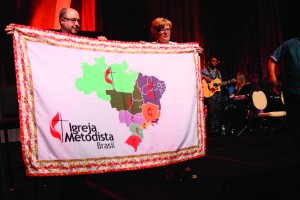
Photo courtesy of World Methodist Council.
By Sam Hodges-
There’s no better place than a World Methodist Conference to witness the scattered seeds and deep roots of John Wesley’s approach to Christianity. Some 2,500 Wesleyan faithful, from 108 countries and 88 communions including The United Methodist Church, met in Houston for the 21st such gathering.
“John Wesley said the Methodists are one people throughout the world,” said United Methodist Bishop Scott Jones, who as newly assigned Texas Conference episcopal leader offered greetings at an August 31 opening service. “It’s in this conference, as we gather together from so many different places, that that unity becomes visible.”
The World Methodist Conference is a once-every-five-years meeting of the World Methodist Council, an association of 80 Methodist, Wesleyan, and related United and Uniting churches, representing 80.5 million people.
The opening service may not have had Olympics-level choreography, but it did have a stirring parade of denominational banners — carried by groups from Nepal, Nigeria, and New Zealand, to name a few — as the crowd sang Charles Wesley’s “O For a Thousand Tongues to Sing.”
Greetings were given by Jones, but also by Bishop Vashti Murphy McKenzie of the African Methodist Episcopal Church and Senior Bishop Lawrence Reddick III of the Christian Methodist Episcopal Church, who oversee Texas churches for their denominations.
Prayers came from Bishop Paulo Lockmann, president of the World Methodist Council and a leader of the Methodist Church in Brazil, and from Archbishop Michael Kehinde Stephen, of the Methodist Church Nigeria. The music, led by Jorge Lockward of the United Methodist Board of Global Ministries, ranged from gospel to South American flutes to traditional church choir numbers, and included the crowd singing “How Great Thou Art” in their own languages.
For the Rev. Emerson Castillo, the opening service alone justified his journey from El Salvador. “I feel I understand how God can move between all of us even in our diversity and differences and cultural backgrounds,” said Castillo, who works for the Council of Evangelical Methodist Churches of Latin America and the Caribbean and leads a church in El Salvador. “Even though there were many languages represented, the spirit guided us as one church.”
Astrophysics and Psalm 8
The World Methodist Conference, in contrast to The United Methodist Church’s General Conference, is not about legislation, budgets, and other forms of church politics. Instead, it’s an occasion for people of the Methodist tradition to be together. The event featured daily worship services and teaching in a variety of formats.
For the opening worship, a conventional sermon was replaced by a dialogue between astrophysicist Jennifer Wiseman, a member of Deer Park United Methodist Church in Reisterstown, Maryland, and David Wilkinson, a scientist-turned-theologian teaching at St. John’s College, Durham University in England.
They rooted the talk in Psalm 8 (“When I consider thy heavens, the work of thy fingers, the moon and the stars, which thou hast ordained …”) but also projected images of distant galaxies and emphasized how the latest research underscores the vastness of the universe.
“I glean from this that the God we pray to is awesome,” said Wiseman. Wilkinson argued that Christians should welcome, not feel threatened by, the fast march of science. “It’s a gift to liberate; it’s a gift to heal; it’s a gift to instill in us awe and wonder,” he said.
Roots and relevance
The Rev. Rudy Rasmus, pastor of St. John’s United Methodist Church in Houston, touched on the segregation of his youth, the pace of technological change, and the need for the church to love sincerely, energetically, and without precondition if it’s going to avoid obsolescence.
He recalled how he came to faith well into adulthood at Houston’s Windsor Village United Methodist Church, thanks to the embrace of its pastor, the Rev. Kirbyjon Caldwell, and the congregation. “I could care less what the Book of Discipline said in that moment. What I really wanted to know was, ‘Do you love me?’” Rasmus said. But Rasmus, recalling how the local zoo was more welcoming than white churches in his youth, also challenged the audience to seek justice as it loves. “Love should be creating a disruption in your part of the world,” he said.
Professor fears church division is ‘a given’
The World Methodist Conference is, by and large, a feel-good event. But this one took a somber turn when one speaker frankly addressed the schism threat in The United Methodist Church over the issue of homosexuality.
The Rev. Ted Campbell, a United Methodist elder and professor at Southern Methodist University’s Perkins School of Theology, argued in his September 1 plenary address that the denomination cannot hold together. “The question at this point is not whether we divide or not,” said Campbell, standing under a “One” sign that signified the unity theme of the conference. “That I fear is a given now.”
Campbell’s talk brought a response from United Methodist Bishop Bruce R. Ough, president of the United Methodist Council of Bishops. The council was, at the direction of the 2016 General Conference, preparing to name a commission to study and consider revisions in church policies on homosexuality. “I think it’s helpful to have voices that are being realistic about how divided we are,” Ough said in an interview after Campbell’s talk. “At the same time, I believe it’s important that we not start the work of the commission making assumptions that we’re already divided and there’s no way back.”
Essentials and non-essentials
Campbell used much of his talk for what amounted to a church history lesson, rooted in the old saying (often incorrectly attributed to John Wesley, he noted) that a church should have “in essentials unity, in non-essentials liberty, in all things charity.” Rupertus Meldenius, the 17th century Lutheran who introduced the phrase, meant the church should have unity in necessary beliefs, flexibility in other beliefs, and a charitable attitude regarding both.
Campbell noted that a large majority of delegates to recent United Methodist General Conferences have voted to uphold restrictive church law regarding homosexuality. “So this matter now has the functional status of an ‘essential’ or ‘necessary’ teaching alongside the teachings of the ancient church and the Reformation and the Wesleyan movement as something that unites and divides us,” he said.
Campbell pointed out that some United Methodist annual conferences disagree so strongly with church law on homosexuality that they have passed non-conformity resolutions. That includes ignoring the restriction against ordaining “self-avowed practicing” gay clergy. “When annual conferences declare that they will not follow the law of the church, I think that is in fact a division,” Campbell said.
Though his talk was scholarly, Campbell shared a story about a Perkins student whom he described as the school’s academic star and one whose commitment to prayer exceeded Campbell’s own and that of most other faculty. But the man eventually left school, understanding that his homosexuality would prevent his ordination in The United Methodist Church. “These problems are not hypothetical,” Campbell said. “They take the form of real human beings.”
Campbell asked the World Methodist Conference audience to pray for The United Methodist Church and offer it counsel and other support.
God’s imagination
Ough said he approached Campbell — his friend for years — after the address to counter the view that the denomination can’t hold together. “I think it’s far more helpful, and also far more faithful, to assume that God’s imagination is greater than our impoverished imagination, and that if we surrender to that we might discover ways to be together that might look different, but nonetheless continue and affirm our unity,” Ough said.
Lyon wins Peace Award
One highlight of the conference’s last day was the presentation of the World Methodist Peace Award to the Rev. Jo Anne Lyon. She’s a former general superintendent of The Wesleyan Church denomination, but the award recognized her as founder and longtime leader of World Hope International.
She started that nonprofit in her home, and under her leadership, it grew into a major Christian relief and development agency, now working in 30 countries. The group has focused on bringing clean water and spiritual nourishment to communities, as well as providing holistic healing programs for post-war amputees.
Lyon herself has worked to raise awareness of human trafficking, and she represented her denomination on President Obama’s Advisory Council on Faith-Based and Neighborhood Partnerships.
“Seeking justice alone can become all political,” Lyon said. “But righteousness without seeking justice for others leads to isolation from the world. We find that balance including both justice and righteousness, rooted in the Bible and in our historical identity.”
In her plenary address, Lyon noted the power inherent in the 80.5 million people represented in the 80 Methodist, Wesleyan, and related United and Uniting groups that are part of the World Methodist Council.
“Eighty million of us. That’s a lot of folks, people!” she said. “And God can do a lot with us. And if we can get focused on the mission and vision God has for us, literally at this time in history the world can be turned upside down.”
Sam Hodges, a United Methodist News Service writer, lives in Dallas.

by Steve | Oct 26, 2016 | Magazine, Magazine Articles, Sept-Oct 2016
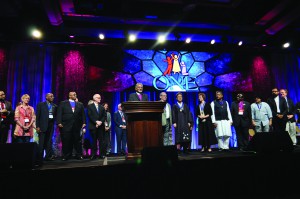
Bishop Ivan Abrahams, World Methodist Council General Secretary, and other leaders. Photo courtesy of World Methodist Council.
By Elizabeth Glass-Turner-
The brilliance of the World Methodist Conference is still shifting through my mind; light through a suncatcher hanging on a window.
The days in Houston were color, sound, faces, laughter, weeping, worship, intensity, frustration, revelation. I met people and forgot names. I met people and remembered names. I saw textiles woven with Methodist patterns, saris shimmering, archbishop caps velvety and plush; music, art, science, all pinned up by prayer and thanksgiving and yearning and the plastic mechanics of translation headsets. There were laughing reunions of old friends, businesslike introductions, notes hastily scribbled while listening to profound speaker after profound speaker, paper business cards exchanged. Houston humidity was hanging heavy on the air, the heaviness clouding the jetlagged faces of international delegates. Energy emitted from others in waves strong enough they could’ve charged a few of the always-dying smartphones of delegates and participants.
Parsing out such a gathering takes months.
A couple of undercurrents of thought emerged, though. They bubbled up in chats, they surfaced in workshops and seminars, they popped up in a plenary or two. One current was simple joyous celebration in the very bringing together of such a globally diverse gathering. Attendees were glad to be present with so many other people from countries most have never been to. The parade of banners in Opening Worship illustrated just how far the Wesley brothers’ influence traveled. The Methodist Church of Tonga? Fiji? Southern Africa? Kyrgyzstan? Italy? And then there were Nazarenes, United Methodists, A.M.E. Zions, Wesleyans, C.M.E.s, A.M.E.s, Free Methodists, all branching out into the world from the United States. Methodism has been present in many nations around the world for over a century. At one point, in fact, early in Methodist days, a well-meaning evangelist sailed to the Caribbean only to find that Methodism was already there, thanks to the work of an earnest layperson.
Another current that emerged was the nature of our continued engagement with our world. And it was here that some different perspectives emerged. Both views fully affirmed the value of social justice and works of mercy; the crux was revealed in how they went about it.
In one workshop, handouts were distributed encouraging ministers not to ever try to evangelize a person from another faith (though “evangelize” was not defined). It recommended not only learning from another person’s faith (a laudable effort in itself), but rather accepting that no religion has a unique truth claim, and therefore it is inappropriate to suggest that yours does.
In the same workshop, a Bishop with a great deal of experience partnering with Muslim leaders to fight common diseases expressed a sense of frustration at this approach, asserting that his Muslim friends would not take him seriously if he was apologetic for his faith, and that he was comfortable working in interreligious partnerships while also being comfortable in his own skin as a Christian.
In conversations, I noted a slight change in demeanor occasionally when I explained my job title: Associate Director of World Methodist Evangelism. There was hesitancy while I briefly shared our vision of faith sharing, and a bit of polite social distance when I described the value of approaching faith sharing through word, deed, and sign. In other words, providing hurricane relief or microloans or wells for clean water is wonderful; doing it in the name of Christ, along with proclamation and prayer, could become aggressive, intolerant, and disrespectful.
And yet there was another subtext also potentially lacking a robust appreciation of the redemption of all Creation: that anything not accompanied by explicit sharing of the message of Christ is wasted (a line of thinking woefully lacking in a full theology of prevenient grace; Jesus healed nine lepers who walked away healthy yet lacking spiritual insight, but he healed them nonetheless, and that was a good thing).
For a bit of clarity, let’s sketch out the Christian theology behind this discussion.
Special or specific revelation can refer to the revelation of the nature of God through the Incarnation of the person of Jesus Christ. It refers to the special revelation of God through the unique supernatural means.
General revelation can refer to awareness of God through reason or nature, accessible to anyone through natural means.
Now if you don’t like that distinction or those definitions, you can take it up with St. Thomas Aquinas. For our purposes, they’re helpful.
If you embrace the postmodern assumption that nothing can be known for certain, then you wrestle with the idea of special or specific or supernatural revelation. After all, it would be arrogant to claim one person has special revelation in that context. And extremists (in the Middle East) who kill civilians by blowing themselves up or who (in North America) picket military funerals in protest of homosexuality claim special revelation, and we don’t want to be like them. There is an extraordinary deeply felt lack of optimism when it comes to the competing claims of world religions.
What, then, provides for optimism? The hope that those religions can emphasize what they hold in common, in order to provide tangible help to the suffering. And that, in itself, is not a bad thing. It’s good when a Bishop has close Muslim friends with whom he works to eradicate a terrible disease. It’s good when pastors mourn when a local imam is killed. It’s good when imams mourn when pastors are killed.
The questions that Christians must answer are what we believe, why we believe it, why we are Christians, and, at a conference like the World Methodist Conference, why we are Methodists.
I am not a Methodist so that I can be a better humanitarian. I appreciate humanitarians; they do a lot of good in the world, and that is a great thing. There are many organizations I could join to be a good humanitarian, though, and they have a lot less parliamentary law.
And I am not a Methodist out of sentimentality for my upbringing in Wesleyan Methodist theology. I appreciate heritage; it guides us in our identity and values. There are many organizations I could join to appreciate heritage, though, and they have a lot less parliamentary law.
Wesleyan Methodism is a way for me to be a Christian. If I did not believe in the specific revelation of the nature of God through Jesus Christ, I would not be a Christian. I wouldn’t waste my time with the parliamentary law of denominations or fellowships or conferences. If I just wanted to make the world a better place, I would join Greenpeace or the Red Cross or the Peace Corps or the U.N. (though that last one would reburden me with parliamentary law). I want the world to be a better place and I’m thankful for those organizations. They do a lot of great, worthwhile work.
But I am a Christian who wants the world to be a better place. And I value Wesleyan Methodism as a way to be a Christian. And if I follow Christ – imperfectly, believing more fully some days than others – if I choose to follow Christ, then that shapes how I interact with the world. And I will talk about Jesus because without Jesus I’m a jerk. And when I see a great initiative about wells for villages I will think of Jesus sitting by a well talking to a woman who, in my town, would be the woman with the smeared mascara and cheap dye job still wearing yesterday’s clothes. And when people ask about my Christ medallion, I smile. I’ve eaten Saltines with a sip of Welch’s, I’ve eaten Hawaiian bread with a sip of grape juice, I’ve dissolved a wafer on my tongue with a sip of port wine, and I’ve tasted in all of them the Body of Christ, the Blood of Christ.
I’ve eaten with Muslims and agnostics, with atheists and Wiccans, with Buddhists and Baptists. I enjoy breaking bread with people who are different than I am. I don’t want any of them to go hungry. I want to share what I have with them, whether they ever believe what I believe or not.
But I’m also comfortable with my vocational call to proclaim Jesus Christ, and him crucified – or as I told my first congregation, “if I didn’t believe this, I wouldn’t waste your time; if I ever stop believing, I’ll stop preaching.”
Humanitarian work is valuable, deeply so. Just The Bill and Melinda Gates Foundation alone illustrates that. One could say it is a means of general revelation. (Although I should note that Melinda Gates is open about her Catholic faith.) And if someone’s deep skepticism about goodness in the world is lessened because I hold a door open for her, all the better: perhaps that will soften her heart to consider whether there might be a benevolent Creator.
The work of the church, however – the work of the Body of Christ, the Church Universal – always goes beyond general revelation. It proclaims Christ, even as newly sainted Mother Teresa did when she taught her sisters that to touch a smelling, diseased, infected, helpless man or woman was to touch Jesus. Witness requires sacrifice; it requires self-denial. Even Jesus prayed, “Father – not this. Not this…” And so while, as good Wesleyan Methodists, we seek to become more and more Christlike, perhaps the Spirit makes us so by allowing us to treat others – no matter how repulsive we personally may find them – as if they were Jesus in the flesh.
It is the only way to keep hate from seeping into my heart: hate towards groups like Westboro; hate towards racists and rapists; hate towards bigots and big-mouths; hate towards bullies and exploiters. I have found that, Jesus’ “goodness, like a [leash], binds my wandering heart to thee.”
Christ has died – to make all things new, as we are anointed to carry out alongside him through the Holy Spirit.
Christ is risen – conquering the ugliest realities of the universe, a sign that death will die, as we are anointed to proclaim through the Holy Spirit as we bring life to dying people and places.
Christ will come again – breathing the promise of God’s Kingdom fully realized, a way of being where there is no more crying, no more pain, and we share this promise when we work to relieve suffering, as we are anointed to proclaim the healing of the nations through the Holy Spirit.
Yes, we speak of Jesus, because we cannot be silent. In our work, in our prayers, our hearts’ cry is the Son of God, Emmanuel, God With Us, Bright and Morning Star. It is through the light of Christ we see, and by his wounds we are healed. It is his Body we celebrate, the Word Made Flesh, and it is on this mystery we meditate while volunteering at soup kitchens or planting community gardens or shoveling a widow’s driveway or paying the utility bills for a laid-off neighbor or structuring a microloan process for former sex workers.
We follow Jesus wherever he leads, we celebrate his company, and we invite you to walk with us on our pilgrimage. You may say no; we’ll still share water from our canteen. You may say no; we’ll still offer bandages for your blisters. You may say no; we’ll still tell roadside jokes, tears streaming down our faces from laughter. But this? This is how we walk.
Won’t you walk with us?
Elizabeth Glass Turner is the Associate Director for Community and Creative Development at World Methodist Evangelism. She is also the editor of www.wesleyanaccent.com. Reprinted by permission of Wesleyanaccent.com.

by Steve | Oct 26, 2016 | Magazine, Magazine Articles, Sept-Oct 2016
 By Bill Arnold-
By Bill Arnold-
The Wesleyan Covenant Association (WCA) is a new alliance of congregations, pastors, and laypeople, coming together to enhance and support vibrant, scriptural Christianity within United Methodism.
The question for many is why? Why form the WCA? And why now?
I have been involved with the WCA since its beginning. My reasons are complicated, and reach back to my ordination as an elder in the Church, and beyond.
When I was ordained in the UM Church, I answered certain familiar questions that many have answered before me. These are part of what we call the “Historic Examination for Admission into Full Connection” as an elder in the church (Book of Discipline, paragraph 336). These questions were formulated by John Wesley and have been asked of every Methodist preacher from the beginning with little change. They are, of course, “historic” and are therefore not obligatory as official polity. Few would insist, for example, that every Methodist minister must recommend fasting and abstinence “both by precept and example” (question #16). And yet, while not official polity, they are treasures left to us by Father John himself, and they contain wonderful insight into what we ought to be and do as Methodist clergy (such as diligently instructing “the children in every place,” #14). Along these lines, I find especially instructive the following three, which seem as relevant now as in Wesley’s day (questions #11–13).
• Have you studied our form of Church discipline and polity?
• Do you approve our Church government and polity?
• Will you support and maintain them?
In the context of Methodism’s early history, one of the reasons these questions were asked was to address the debate between episcopal forms of government versus congregational forms. As a United Methodist, I continue to believe the episcopal form of church governance is preferable. In this, I agree with John Wesley in his sermon “Catholic Spirit” in which he embraced an episcopal form of government as scriptural and apostolic. I have been privileged to serve as a member of the Southeastern Jurisdiction’s Committee on Episcopacy for four years. I have seen firsthand the task of our bishops, and I think I have a good understanding of the challenging role bishops have in the Church. I stand in awe and appreciation of our SEJ bishops and I am grateful for the leadership they provide.
But of course, these “historic” questions also relate to the concept of accountability. One of the many beauties of early Methodism was the accountability built into being a Methodist Christian. Even now, we have accountability built into the system all along the way (theoretically), from General Conference (and the decisions it makes contained in the Book of Discipline), through the annual and charge conferences, into the life of every local church. I love our connectedness, and the strength in ministry it provides. And that’s part of why I answered “yes” to the historic questions.
• Studied United Methodist discipline and polity? Check.
• Approve our government and polity? Check.
• Support and maintain them? Check.
So how does all this relate to the WCA? Some pastors, local churches, and conferences in the UM Church, have decided, with deliberate forethought, that they can no longer approve our church’s government and polity.
General Conference 2016 did not alter our views on human sexuality. And yet, since the conclusion of General Conference in Portland, a number of boards of ordained ministry in some annual conferences have said they will no longer uphold the ordination standards prescribed in the Book of Discipline. Others have declared they stand in “non-compliance” with the General Conference on the question of same-sex weddings and ordination of practicing LGBT+ candidates for ministry. On July 15, the Western Jurisdiction elected a married lesbian as bishop, who assumed an episcopal role in the Mountain Sky Area (being the Rocky Mountain and Yellowstone Annual Conferences).
By contrast, the General Conference did, in fact, change our Church’s relationship with the abortion-rights advocacy group “Religious Coalition for Reproductive Choice,” by requiring our boards and agencies to withdraw from it. Almost immediately, several annual conferences, in deliberate defiance of the intent and will of the General Conference, voted to join the RCRC.
The accountability of our polity is broken. Our Book of Discipline is no longer accepted as an agreed upon form of administration, holding our Church together as one.
On the one hand, part of me understands and even respects the decision by some United Methodists to declare their open rebellion against the General Conference. They have fought these fights for many decades. They feel the culture and popular opinion in the United States has changed in their favor, and they believe they are standing in a prophetic tradition that requires these actions. They have had enough. They think the UM Church is wrong, and needs to be forced into changing its positions.
I hope those United Methodists will allow me to disagree civilly. I think the changes in culture and popular opinion in the United States are alarming and reflect our broken society as much as anything. Besides, I think such cultural changes are irrelevant to the Church’s position on human sexuality. Fifty years ago during the sexual revolution, the Church failed to articulate and defend a consistent foundation for sexual ethics. As a result, the UM Church’s current standards for ordination and our affirmation of Christian marriage (joining one man and one woman in union for life) appear to many to be hopelessly out of step with the times. Nevertheless, these are biblical and theological mandates, and in the best parts of Christian history, the Church has stood for these principles. The burden of proof for changing those standards must rest squarely on the foundation of clear and compelling biblical exegesis. So far, I have been unconvinced such a case can be made.
At the same time, the Church is being called to a more proactive, loving, and robust ministry to persons experiencing same-sex attraction. With regard to the UM Church specifically, I grieve over the loss of accountability in our Church’s governance and polity, without which we cannot move forward as a unified branch of the Wesleyan movement.
And so, at this moment in our Church’s history, many have publicly announced their decision to break from the governance and polity of The United Methodist Church. I have chosen this venue, the Wesleyan Covenant Association, as a place to say, just as publicly, that I support and maintain that governance and polity. Through the WCA, I commit myself to uphold and maintain the governance and polity of The United Methodist Church.
The WCA is nothing more for me than a way to embrace Methodism. I love our Church. I love its rituals, its history and heritage, and I love its Wesleyan theology. In short, I love being United Methodist. Other than the influence of my godly parents, God worked through The United Methodist Church more than anything else to redeem my life, nurture my faith, teach me the Scriptures, confirm my calling, and ordain me to ministry.
The WCA is a way of saying all this publicly – of recommitting myself to my ordination vows. I want to be a good Methodist. At this point in time, that means participating in the work of the Wesleyan Covenant Association.
Bill Arnold is an ordained elder in the Kentucky Conference of The United Methodist Church and professor of Old Testament studies at Asbury Theological Seminary in Wilmore, Kentucky. Bill has been a delegate to three General Conferences and is the author of numerous books including Introduction to the Old Testament (Cambridge University Press) and Seeing Black & White in a Gray World (Seedbed). This article originally appeared on www.teddyray.com and is reprinted by permission.










